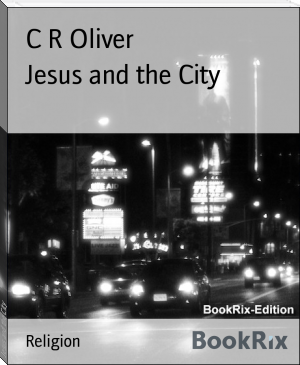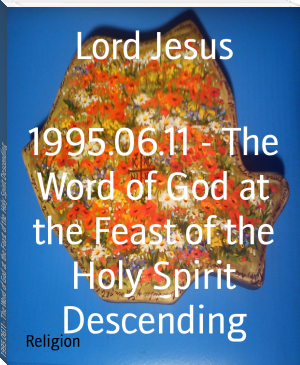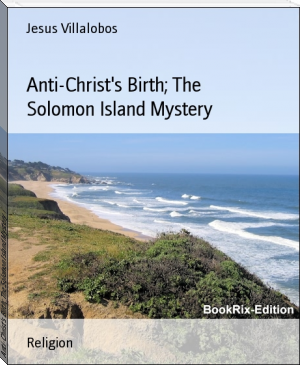Jesus and the City - C R Oliver (best e reader for academics .TXT) 📗

- Author: C R Oliver
Book online «Jesus and the City - C R Oliver (best e reader for academics .TXT) 📗». Author C R Oliver
2 'Do you think they were worse sinners than other men from Galilee?' He asked. 'Is that why they suffered?'
Luke 13:4-5
'And what about the eighteen men who died when the Tower of Siloam fell on them? Were they the worst sinners in Jerusalem? 5 Not at all! And you, too, will perish unless you repent.'
These questions were both open-ended and loaded. The two questions had one answer, "Better be prayed up, repented and ready to face death if you stick around this city." Random selection and the dangerous structure of the territory precluded bloodshed from many sources. Be assured, the Temple itself was not sacred to the Romans.
Soon, His disciples and followers would witness His death at the hands of a mixed adjudication.
Matthew 16:21
21 From then on Jesus began to speak plainly to His disciples about going to Jerusalem, and what would happen to him there--that He would suffer at the hands of the Jewish leaders, that He would be killed, and that three days later He would be raised to life again.
Mark 10:32 Now they were on the way to Jerusalem, and Jesus was walking along ahead; and as the disciples were following they were filled with terror and dread.
Jesus' disciples began to view Jerusalem from a different perspective. (Often familiarity and reverence for a place blinds one's eyes from reality. Is it not time to examine why Jesus spoke to the fig tree which would not respond to entreaty and care?)
Luke 13:6-9
6 Then he used this illustration: 'A man planted a fig tree in his garden and came again and again to see if he could find any fruit on it, but he was always disappointed. 7 Finally he told his gardener to cut it down. 'I've waited three years and there hasn't been a single fig!' he said. 'Why bother with it any longer? It's taking up space we can use for something else.'
8 'Give it one more chance,' the gardener answered. 'Leave it another year, and I'll give it special attention and plenty of fertilizer. 9 If we get figs next year, fine; if not, I'll cut it down.'
Israel and Jerusalem were often seen as the "fig tree."
Jerusalem was no longer to be viewed in light of its historic place, but as God saw it--a city no longer governed by a responsive collective.
(Perhaps it is time to view ministries and movements in light of their fruit, rather than their mission statements. Just maybe, it is time to put the axe to the root of the unresponsive, rebellious constructs which are posing as churches and ministries.)
Jerusalem: The Subject Matter of the Transfiguration
As a matter of fact, the subject matter discussed by Moses and Elijah was Jerusalem. Moses had never been there as a mortal. Elijah had fled its gates under indictment by a wicked governance.
Luke 9:28-31 Transfiguration:
Eight days later He took Peter, James, and John with Him into the hills to pray. 29 And as He was praying, His face began to shine, and His clothes became dazzling white and blazed with light. 30 Then two men appeared and began talking with him--Moses and Elijah! 31 They were splendid in appearance, glorious to see; and they were speaking of his death at Jerusalem, to be carried out in accordance with God's plan.
Jesus' disciples needed to see the plan of God and what part Jerusalem played in it. They were to view the city, not as a familiar and favored spot, but as a place where the covenant of Jesus' blood would stain its streets and forever change its significance.
Luke 18:31-33
31 Gathering the Twelve around him He told them, 'As you know, we are going to Jerusalem. And when we get there, all the predictions of the ancient prophets concerning me will come true. 32 I will be handed over to the Gentiles to be mocked and treated shamefully and spat upon, 33 and lashed and killed. And the third day I will rise again.'
(What has the church "handed over" to government in our day? The list is lengthened daily. "Handing Over" is the "smooth" way to accomplish the church's venial goals.)
The Triumphal entry targeted Jerusalem:
Luke 13:33-35
For it wouldn't do for a prophet of God to be killed except in Jerusalem!
34 'O Jerusalem, Jerusalem! The city that murders the prophets. The city that stones those sent to help her. How often I have wanted to gather your children together even as a hen protects her brood under her wings, but you wouldn't let Me. 35 And now--now your house is left desolate. And you will never again see Me until you say, "Welcome to Him who comes in the name of the Lord.'
Turn now to Jesus' intent in cleansing the Temple. The people hailed Him, the authorities did not. Nonetheless, He taught the Word all day long to those in attendance.
Matthew 21:10-12
10 The entire city of Jerusalem was stirred as He entered. 'Who is this?' they asked. 11 And the crowds replied, 'It's Jesus, the prophet from Nazareth up in Galilee.' 12 Jesus went into the Temple, drove out the merchants, and knocked over the moneychangers' tables and the stalls of those selling doves.
Matthew 21:23
3 When He had returned to the Temple and was teaching, the chief priests and other Jewish leaders came up to Him and demanded to know by whose authority He had thrown out the merchants the day before.
A great divide can be seen in the citizenry of the ancient community. Those of the power elite were threatened and sought a plan to jeopardize His popularity. The general public saw His miracles and wanted more of them. The general population wanted to hear Him. The governing agents did not want what He offered because repentance was far from them. (Jerusalem, today, is still a [nation and] city divided between two groups: the Sephardic and the Ashkenazim.)
Luke 19:47-48
47 After that He taught daily in the Temple, but the chief priests and other religious leaders and the business community were trying to find some way to get rid of Him. 48 But they could think of nothing, for He was a hero to the people--they hung on every word He said.
In another place:
John 2:17-24
17 Then his disciples remembered this prophecy from the Scriptures: 'Concern for God's House will be my undoing.'
18 'What right have you to order them out?' the Jewish leaders demanded. 'If you have this authority from God, show us a miracle to prove it.'
19 'All right,' Jesus replied, 'this is the miracle I will do for you: Destroy this sanctuary and in three days I will raise it up!'
20 'What!' they exclaimed. 'It took forty-six years to build this Temple, and You can do it in three days?' 21 But by 'this sanctuary' He meant His body. 22 After He came back to life again, the disciples remembered His saying this and realized that what He had quoted from the Scriptures really did refer to Him, and had all come true!
23 Because of the miracles He did in Jerusalem at the Passover celebration, many people were convinced that He was indeed the Messiah. 24 But Jesus didn't trust them, for He knew mankind to the core. No one needed to tell Him how changeable human nature is!
In verse eighteen, the Jewish leaders issued the exact same challenge satan chose with Jesus. Why? They were of their father, the devil, just as He said. When the house of God is ruled by those who have not been born again, the religious system becomes exceedingly untrustworthy. Jesus didn't trust the people to know the difference. He knew they would be swayed, as they eventually were, against Him.
Jerusalem, prepared for the crucifixion and the birth of the early church.
Mark 14:12-13
2 On the first day of the Passover, the day the lambs were sacrificed, His disciples asked Him where He wanted to go to eat the traditional Passover supper. 13 He sent two of them into Jerusalem to make the arrangements.
In order for a new covenant to be established, the transition had to take place in Jerusalem.
(It is not necessary to cite the passages concerning the new covenant significance of the elements of bread and wine at this point. The Last Supper, when combined with the crucifixion, along with the death, burial and resurrection of Jesus, gave life to the final covenant. The early church had to be birthed on the day of Pentecost (in that same upper room--which was symbolically tied to the new face of Jerusalem in prophecy).
Luke 23:26-31
26 As the crowd led Jesus away to His death, Simon of Cyrene, who was just coming into Jerusalem from the country, was forced to follow, carrying Jesus' cross. 27 Great crowds trailed along behind, and many grief-stricken women.
28 But Jesus turned and said to them, 'Daughters of Jerusalem, don't weep for Me, but for yourselves and for your children. 29 For the days are coming when the women who have no children will be counted fortunate indeed. 30 Mankind will beg the mountains to fall on them and crush them, and the hills to bury them. 31 For if such things as this are done to Me, the Living Tree, what will they do to you?'
After His payment for our sins, and the shedding of His blood as the supreme sacrifice, came an earth shaking conclusion which was followed by God raising Jesus from the dead. So powerful was that forthcoming many graves were opened and Jerusalem saw the Godly dead come to life and walk the streets and visit loved ones.
Matthew 27:51-53
And look! The curtain secluding the Holiest Place in the Temple was split apart from top to bottom; and the earth shook, and rocks broke, 52 and tombs opened, and many Godly men and women who had died came back to life again. 53 After Jesus' resurrection, they left the cemetery and went into Jerusalem, and appeared to many people there.
Notice, this was a selective group that came back to life: the Godly dead. The ungodly remained in the grave!
After His resurrection, Jesus remained in Jerusalem to prepare the Disciples for the birth of the church. Jerusalem transitioned from the city of the Ancient Jews--to the city where Christianity was founded.
Luke 24:46-53 (ascension)
46 And He said, 'Yes, it was written long ago that the Messiah must suffer and die and rise again from the dead on the third day; 47 and that this message of salvation should be taken from Jerusalem to all the nations: There is forgiveness of sins for all who turn to Me. 48 You have seen these prophecies come true.
49 'And now I will send the Holy Spirit upon you, just as My Father promised. Don't begin telling others yet--stay here in the city until the Holy Spirit comes and fills you with power from heaven.'
50 Then Jesus led them out along the road to Bethany, and lifting His hands to heaven, He blessed them, 51 and then began rising into the sky, and went on to heaven. 52 And they worshiped Him, and returned to Jerusalem filled with mighty joy, 53 and were continually in the Temple, praising God.
Naturally, the Disciples considered the Temple as the place for proper worship, but not for long. Their kind soon understood how Jesus' Supreme Sacrifice had negated the animal offerings. The attitude of those "running the show" was raw and unfriendly toward them. Finally, the Jerusalem Christians saw their numbers increase at first, then decrease as more and more fled before the persecution.
Acts 1:3-4
3 During the forty days after His crucifixion he appeared to the apostles from time to time, actually





Comments (0)